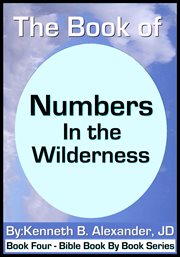Nonfiction
eBook
Details
PUBLISHED
Made available through hoopla
DESCRIPTION
1 online resource
ISBN/ISSN
LANGUAGE
NOTES
Introduction to Numbers. The fourth book of the Hebrew Torah (The Law) called the "Pentateuch" in Greek, is the Book we know as "Numbers". In the Hebrew Bible it is called "be-midbar" meaning "in the wilderness." In the Greek Septuagint version of the Bible (LXX) it is called "Numbers," and this name is now the usual title of the book. It is so called because it contains a record of the numbering of the people in the wilderness of Sinai (Chs. 1-4), and of their numbering afterwards on the plain of Moab (Ch. 26). The Book takes up where Exodus left off in the saga of Israel in the wilderness. The Hebrew name for the Book "in the wilderness" is a better title for the Book. Although the book is noted for its two censuses, important events took place in the wilderness which relate to the present time. We will go through the book with the historical developments discussed first. The priestly elements and the censuses will be discussed at the later portion of the study. The Book explains why Israel had to stay in the wilderness for forty years. It was an 11 Day journey from Egypt to the Promised Land of Canaan. But spies sent in to access the land brought back a bad report and God in His anger punished all of Israel. The whole of Israel's stay in the wilderness generally portrays an unhappy people blaming Moses for their unhappiness. Time and time again Moses had to defend himself against unwarranted accusations. Ultimately it was God who had to stand up for him calling him "the humblest man to ever walk the earth". Time and time again God purposed to destroy the people for their grumbling and accusations. Each time Moses had to implore the Lord not to do that. Nevertheless God would send judgments among them in the form of plagues, fiery serpents and other expressions of His wrath. Thousands were killed. Moses had to stave off the extent of the destruction by bargaining with God not to completely destroy the people. This clearly shows that, even in this day, we should not grumble against God as He deals with our hearts. His chastenings are just. They are designed to get us into our Promised Land the Kingdom of God. We should follow New Testament quotations that relate to difficulties in our walks with God. For instance, as James said of the Christians of his day, which should have applied to Israel in the wilderness: "Consider it all joy, my brethren, when you encounter various trials, knowing that the testing of your faith produces endurance [steadfastness]. And let endurance [steadfastness] have its perfect result, so that you may be perfect and complete, lacking in nothing" (James 1:2-4). And Peter said: "In this you greatly rejoice, even though now for a little while, if necessary, you have been distressed by various trials, so that the proof of your faith, being more precious than gold which is perishable, even though tested by fire, may be found to result in praise and glory and honor at the revelation of Jesus Christ;" (1 Peter 1:6-7). And it was said of Christ Himself: "Although He was a Son, He learned obedience from the things which He suffered" (Hebrews 5:8). The people of Israel had such great promises from the Lord but they, like us, sometimes could not endure with joy the hardship that is the Lord testing our faith. The complaining began in Exodus. They complained that the Egyptians came after them. They complained until Moses parted the Red (Reed) Sea. They complained on the other side because they had no water or food. In short their faith in God was at "zero" despite what God had done in delivering them from slavery and protecting them from the Plagues he brought against Egypt. Nevertheless the next generation made it to the banks of the Jordan River poised, after forty years, to possess the Land
Mode of access: World Wide Web







